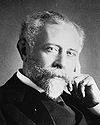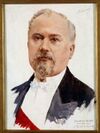Aureliana
The Federal Territory of Aureliana Le Territoire Fédérale d'Auréliana | |
|---|---|
| Motto: Brille, ô promesse de la liberté | |
| Anthem: 'L'hymne d'Auréliana' | |
| Capital and largest city | Saint-Lazare |
| Official languages | Auvernian |
| Recognized languages | Aurelian |
| Ethnic groups | Auvernian (95.2%)
Indigènes (4.3%) Other (0.5%) |
| Demonym(s) | Aurelian |
| Government | Federal Territory |
• Governor-General | Louis Montand |
• Prime Minister | Bruno Percival |
| Legislature | Territorial Congress |
| The Senate | |
| The Assembly | |
| History | |
• Discovery | 1821 |
• The Luistian Expedition | 1832 |
• The Auvernian Expedition | 1841 |
• Auvernian Protectorate Status Established | 1844 |
• First Auvernian Settlements | 1848 |
• Home Rule Established | 17 APR 1881 |
• The Great War Begins | 1912 |
• The Second Auvernian Revolution | 1925 |
| Population | |
• 1935 estimate | 910,234 |
| Currency | Auvernat (AVT) |
| Driving side | right |
| Calling code | 33 |
Aureliana, officially the Federal Territory of Auvernia (Auvernian; Le Territoire Fédérale d'Auréliana), is a dependent semi-autonomous state located in Eastern Antarctica. Aureliana is bordered solely by Hawaiki to her East, to her south and west meeting the practical limitations of her extent by the large glacial ice which covers most of the continent. The population of the country is largely concentrated in northern towns with smaller rural populations in the southern Tundra. The most populous areas are the capital district centered around the city of Saint-Lazare. Outside of the capital district most of central and southern Auvernia is forested or mountainous marked by large national parks and small human settlements. Aureliana is a federal territory of the Auvernian Federation with its own Territorial Congress consisting of a Senate and Assembly mirroring the government of Auvernia and has a separation of powers between its Executive, Judicial and Legislative branches. Finally, Aureliana is principally a Catholic state based upon the same principles of popular sovereignty, republicanism, and national unionism which its homeland is based upon. A major distinction between Auvernian and Aurelian government is that the Governor of Aureliana is appointed by the Auvernian Senate with the approval of the Auvernian President, though the Governor must be a resident of Aureliana. Aureliana was once totally unpopulated with the indigenous Nāngai people having arrived as recently as the late 1600s. The late nature of human arrival has allowed for the many diverse species native to the land to remain intact as many national parks have been established to preserve the pristine beauty of the forests and mountains the country is known for. First contact between the indigenous people and Luistian sailors was made in 1852 after an expedition from Luistia, and a small town containing descendants of that expedition remains in the capital district. However, most inhabitants of Aureliana are Auvernian settlers who began arriving in the 1870s.
Etymology
Aureliana is named after Queen-Consort Aurelia, who was the wife of Sovereign Pierre III and mother of Pierre IV. The name is also identical to that of a territory in Duquesne by the same name which is named after the wife of King Henri VII of Auvernia.
History
Prehistoric Aureliana
Nāngai Aureliana
Early Colonial History
Home Rule Era
Geography
Provinces
Government
Migration
Health
See main article: Health in Aureliana
The Aurelian health care system is a universal health care system with a national health insurance program established during the Merlin administration as the country faced economic hardship. Prior to this development the 1898 Poor Laws instituted by Laurence Vallars instituted a basic social safety net. The Poor Laws provided and continue to provide care for the poorest and most indignant within the populace by providing funds for the poor and disabled to afford visits by private doctors. After the establishment of universal health care, the poor laws are mostly applied in rural areas and a disproportionate number of recipients are rural farmers and indigenous communities. In addition to government healthcare, the Catholic Church runs several charities that provide free healthcare treatment to persons suffering from chronic illness and those in need of hospice care.
Education
See main article: Education in Aureliana
The education system in Aureliana is based off of the old Auvernian system with joint Church and state funded and operated collèges royaux which were originally instituted during the reign of King Charles X in Auvernia. After the Clementinists seized power in 1841, they rebranded this system the lycée system in order to appease secularists. The lycée system provides primary and secondary schooling for citizens and persons legally domiciling in Aureliana covering the ages of 4-17. Education is currently mandatory for all children between the ages of five and fifteen. Post-secondary schooling is provided by the secular, state-funded University of Aureliana and the Catholic operated University of Saint Lazare. Until 1925 Pierre IV Imperial Academy also operated in Saint-Lazare but, along with other imperial academies throughout the Auvernian colonial empire has been temporarily closed since the Revolution of 1925 due to its historically pro-Clementinian ideological curriculum and a chronic lack of funding into colonial investments.
Politics
Political Parties
| Party | Position | Background | Ideology | Leader | Seats in the Aurelian Assembly | Status |
|---|---|---|---|---|---|---|
 |
Right to Far Right | The Royalist League originated as an underground political movement of the dissident right in Aureliana composed of political exiles who fled Auvernia after the collapse of the monarchy and adherents to political Catholicism. After the election of President Clément Sartre in Auvernia, Governor General Louis Montand legalized their political movement allowing them to participate in the 1934 elections and providing a new right-wing source of opposition to the Social Party. The party is officially Legitimist and therefore favors the House of Verdon. | Integral nationalism Royalism Corporate statism |
Nathaniel LeBlanc | 10 / 36 |
|
| Center-right to Right | The Social Party has historically been the dominant political force in Aurelian politics, with every prime minister to date either being an independent or Social Party member. The party was founded by Aurelian home rule advocate Étienne Clément after Home Rule was granted in 1881 with him serving as the country's fifth and longest serving Prime Minister. The party originated as a crypto-legitimist faction which had previously been associated with Laurence Villars but has since become broadly Republican while retaining its legitimist roots. | Subsidiarity Social capitalism National conservatism Factions: Distributism Indigenous rights |
Bruno Percival | 19 / 36 |
||
| Left | The Citizens' Movement constitutes the historical left-wing opposition in Aureliana. Never achieving a governing majority, the Citizens movement has nonetheless had an impact in local elections, especially in the capital city of Saint-Lazare where it had been a dominant force until the arrival of exiles after the 1925 revolution in Auvernia. The party advocates for an independent Republic, social democracy and most controversially, for a complete and total separation between Church and state. | Republicanism Social democracy Anti-clericalism Independence |
Georges Charbonne | 7 / 36 |
List of Heads of Government
Key:
Vallarites Social capitalism, Manifest Destiny
Anti-Vallarites Market Liberalism, Social liberalism
Social Party National conservatism, Subsidiarity, Social capitalism
| No | Portrait | Term | Term | Mandate | Affiliation | ||
|---|---|---|---|---|---|---|---|
 Prime Minister of the Federal Territory of Aureliana Prime Minister of the Federal Territory of Aureliana  | |||||||
| 1 |  Louis Camot (1843-1924) |
1 | 11th of December, 1881 |
12th of April, 1886 |
Majority support of the Assembly | Independent | |
| 2 |  Laurence Vallars (1833-1906) |
1 | 12th of April, 1886 |
9th of April, 1891 |
Majority support of the Assembly | Independent Vallarites | |
| 2 | 16th of April, 1891 |
14th of April, 1896 |
Majority support of the Assembly | Independent Vallarites | |||
| 3 |  Pierre Richelieu (1860-1932) |
1 | 21st of April, 1896 |
19th of April, 1899 |
Majority support of the Assembly | Independent Anti-Vallarites | |
| 4 |  Laurence Vallars (1833-1906) |
1 | 20th of April, 1899 |
18th of April, 1904 |
Majority support of the Assembly | Independent Vallarites | |
| 5 |  Étienne Clément (1860-1934) |
1 | 19th of April, 1904 |
18th of April, 1909 |
Majority support of the Assembly | Independent Vallarites | |
| 2 | 19th of April, 1909 |
18th of April, 1914 |
Social Party Majority Government | Social Party | |||
| 3 | 30th of April, 1914 |
29th of April, 1919 |
Social Party Minority Government | Social Party | |||
| 4 | 30th of April, 1919 |
29th of April, 1924 |
Social Party Majority Government | Social Party | |||
| 6 |  Guillaume Beauchamps (1863-1927) |
1 | 30th of April, 1924 |
17th of December, 1925 |
Social Party Majority Government | Social Party | |
| 7 |  Philippe Daladier (1868-) |
1 | 22nd of December, 1925 |
21st of December, 1929 |
Majority support of the Assembly | Independent | |
| 8 |  Maurice Merlin (1860-1935) |
1 | 23rd of December, 1929 |
21st of December, 1931 |
Social Party Minority Government | Social Party | |
| 2 | 22nd of December, 1931 |
21st of December, 1933 |
Social Party Minority Government | Social Party | |||
| 9 |  Bruno Percival (1903-) |
1 | 28th of December, 1933 |
- | Social Party Majority Government | Social Party | |
Political History
Security Forces
Aurelian Gendarmerie
The Aurelian Gendarmerie serves in a dual role as a police force in rural provinces and as a paramilitary compliment to the Auvernian naval infantry garrison. With 3,400 active servicemen and over 20,000 reservists, the Gendarmerie is divided into five regiments. These five divisions consist of a single motorized infantry regiment, two mounted police regiments, one fire patrol regiment and one bicycle regiment. The mounted police operate throughout the countryside whereas the fire patrol is dispersed throughout Aureliana and the bicycle regiment acts as a compliment to the St Lazare District Police.
Saint-Lazare District Police
Aurelian Coast Guard
The Aurelian Coast Guard is a 2,000 man volunteer Coast Guard responsible for conducting Aureliana's coastal surveillance and meeting Aureliana's maritime protection needs, including in relation to icebreaking, illegal immigration, import inspection, fisheries, and quarantine-related issues.
Aurelian Coastal Defense Regiment
A significant component of the Aurelianan Security Forces is the Coastal Defense Regiment. 1,200 men strong, the regiment provides battery support to Saint-Lazare protecting it from potential harassment by hostile warships, mans a series of towers along the coast which spot and record all ships entering and exiting the port and providing an early warning system to Aureliana's broader Security Forces apparatus, and oversees the network of mines which would be placed in the harbor in the event of an imminent naval invasion.
Demographics
Population
| Census Year | Population |
|---|---|
| 1846 | 9 |
| 1848 | 681 |
| 1850 | 2,168 |
| 1860 | 5,720 |
| 1870 | 28,957 |
| 1877 | 41,293 |
| 1881 | 66,943 |
| 1890 | 189,033 |
| 1900 | 467,219 |
| 1910 | 589,059 |
| 1920 | 614,239 |
| 1930 | 791,408 |
| 1935 | 910,034 |
Ethnic Groups
Languages
Religious Groups
Economy
Commerce
Energy
Gas and Oil
Mining
Transportation
Railroad
Air Travel
Airports
Airlines
Aureliana's international air travel is primarily provided by the Auvernian Imperial Air Corporation and Southern Star Airways. Aureliana also has several local airlines that service its more remote southern settlements including Southern Cross Air Express and the joint government-private operated Aurelian Coastal Air Service.
Highways
Climate
| Climate data for Saint Lazare, Aureliana (1909-1937) | |||||||||||||
|---|---|---|---|---|---|---|---|---|---|---|---|---|---|
| Month | Jan | Feb | Mar | Apr | May | Jun | Jul | Aug | Sep | Oct | Nov | Dec | Year |
| Record high °C (°F) | 26.7 (80.1) |
32.2 (90.0) |
26.0 (78.8) |
20.8 (69.4) |
14.2 (57.6) |
13.2 (55.8) |
14.9 (58.8) |
13.6 (56.5) |
18.2 (64.8) |
20.9 (69.6) |
25.2 (77.4) |
27.4 (81.3) |
32.2 (90.0) |
| Average high °C (°F) | 16.5 (61.7) |
15.8 (60.4) |
15.4 (59.7) |
12.4 (54.3) |
8.9 (48.0) |
6.3 (43.3) |
5.7 (42.3) |
7.1 (44.8) |
10.4 (50.7) |
12.9 (55.2) |
14.1 (57.4) |
16.0 (60.8) |
11.8 (53.2) |
| Daily mean °C (°F) | 10.8 (51.4) |
10.6 (51.1) |
9.1 (48.4) |
6.8 (44.2) |
4.2 (39.6) |
2.1 (35.8) |
1.7 (35.1) |
2.9 (37.2) |
4.7 (40.5) |
6.7 (44.1) |
8.6 (47.5) |
10.1 (50.2) |
6.5 (43.8) |
| Average low °C (°F) | 4.8 (40.6) |
5.3 (41.5) |
4.0 (39.2) |
2.1 (35.8) |
0.1 (32.2) |
−1.3 (29.7) |
−1.9 (28.6) |
−1.0 (30.2) |
−0.5 (31.1) |
0.9 (33.6) |
3.3 (37.9) |
4.5 (40.1) |
1.7 (35.0) |
| Record low °C (°F) | −2.0 (28.4) |
−2.2 (28.0) |
−4.4 (24.1) |
−5.8 (21.6) |
−10.0 (14.0) |
−10.2 (13.6) |
−15.7 (3.7) |
−10.8 (12.6) |
−7.0 (19.4) |
−4.8 (23.4) |
−2.9 (26.8) |
−3.0 (26.6) |
−15.7 (3.7) |
| Average precipitation mm (inches) | 86 (3.4) |
65 (2.6) |
74 (2.9) |
74 (2.9) |
54 (2.1) |
47 (1.9) |
46 (1.8) |
49 (1.9) |
48 (1.9) |
56 (2.2) |
69 (2.7) |
81 (3.2) |
749 (29.5) |
| Average precipitation days | 15 | 12 | 12 | 11 | 9 | 8 | 9 | 9 | 10 | 11 | 13 | 15 | 134 |
| Average relative humidity (%) | 70 | 71 | 73 | 77 | 80 | 82 | 82 | 79 | 76 | 71 | 69 | 69 | 75 |
| Mean daily sunshine hours | 8.4 | 7.8 | 6.6 | 5.5 | 4.8 | 4.4 | 4.6 | 5.6 | 6.3 | 7.6 | 8.4 | 8.7 | 6.6 |






